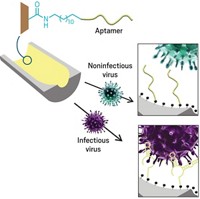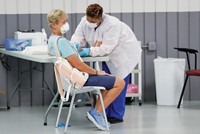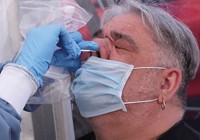Advertisement
Grab your lab coat. Let's get started
Welcome!
Welcome!
Create an account below to get 6 C&EN articles per month, receive newsletters and more - all free.
It seems this is your first time logging in online. Please enter the following information to continue.
As an ACS member you automatically get access to this site. All we need is few more details to create your reading experience.
Not you? Sign in with a different account.
Not you? Sign in with a different account.
ERROR 1
ERROR 1
ERROR 2
ERROR 2
ERROR 2
ERROR 2
ERROR 2
Password and Confirm password must match.
If you have an ACS member number, please enter it here so we can link this account to your membership. (optional)
ERROR 2
ACS values your privacy. By submitting your information, you are gaining access to C&EN and subscribing to our weekly newsletter. We use the information you provide to make your reading experience better, and we will never sell your data to third party members.
Diagnostics
FDA authorizes COVID-19 diagnostic that uses immune cells
Adaptive Biotechnologies’ T-Detect test examines T cells for signatures of viral response
by Megha Satyanarayana
March 13, 2021
| A version of this story appeared in
Volume 99, Issue 9

The US Food and Drug Administration has given Adaptive Biotechnologies an emergency use authorization for its COVID-19 diagnostic kit, which examines immune cells called T cells to determine whether a person was previously infected with SARS-CoV-2, the virus that causes COVID-19. The test, called T-Detect COVID, is the first of its kind available to US consumers.
When a person is infected with SARS-CoV-2, T cells latch onto bits of viral proteins that emerge on the surface of an infected cell. They latch via a protein called the T-cell receptor (TCR), which is genetically unique to each individual T cell. T cells last a long time and can ramp back up if a person gets infected again with the same microbe.
Support nonprofit science journalism
C&EN has made this story and all of its coverage of the coronavirus epidemic freely available during the outbreak to keep the public informed. To support us:
Donate Join Subscribe
Adaptive’s chief medical officer, Lance Baldo, says the firm uses a combination of gene sequencing and bioinformatics to examine a person’s TCRs for genetic information that suggests the person encountered SARS-CoV-2 at some point. A laboratory technician isolates T cells from a tube of blood, sequences the TCRs, and scans the various sequences, looking for genetic signatures that correspond to T cells that have interacted with viral proteins.
The company developed its T-cell bioinformatics program in collaboration with Microsoft and validated the test using human blood samples taken before and after SARS-CoV-2 emerged. In developing the kit, Adaptive found that the test could detect a positive result 97% of the time and a negative result 100% of the time, Baldo says.
There are other diagnostics that look at immune responses—namely, the presence of antibodies to the virus. Most of those tests are designed to look for one particular antibody, and antibody levels fade over time. Baldo says one of the strengths of Adaptive’s test is that it is broad—it can detect nearly any TCR that corresponds to the virus and can identify TCRs that correspond to variants. The test costs $150.





Join the conversation
Contact the reporter
Submit a Letter to the Editor for publication
Engage with us on Twitter